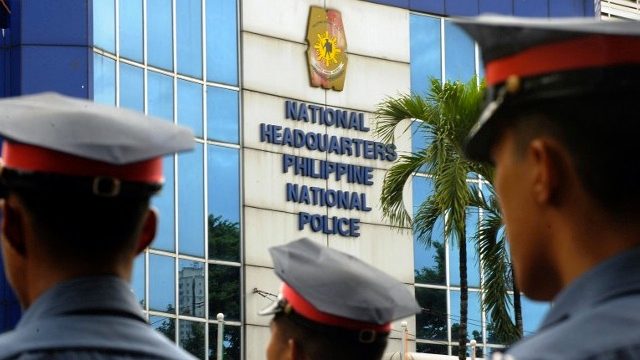SUMMARY
This is AI generated summarization, which may have errors. For context, always refer to the full article.

MANILA, Philippines – A cop allegedly hired as a gunman to slay an international race car driver and at least 12 more involved in an alleged robbery and kidnapping case that went viral.
Those are only two of recent high-profile crimes allegedly involving men entrusted to “serve and protect” the country – members of the Philippine National Police (PNP).
It’s a huge blow to an institution struggling to win the hearts and minds of a public that perceives the police force as untrustworthy and corrupt.
There are more instances. In 2013, PNP and military personnel were implicated in a summary execution in Atimonan, Quezon province. More recently, police from Region 4-A (Calabarzon) were relieved over the alleged torture of suspects detained in a secret lock-up cell.
Still, the PNP’s top generals ask the public not to judge the 150,000-strong police force for the acts of a few. On Tuesday, September 9 – a day after the PNP revealed the alleged involvement of 8 La Loma police station cops in an EDSA kidnapping incident – the Palace defended the PNP.
“[Rogue cops] form a very small proportion of the total strength of the PNP,” Communications Secretary Herminio Coloma Jr told reporters. He also dismissed the idea of the incident being a blow to the PNP’s image.
The number of La Loma cops tagged in alleged kidnapping try has since risen to 12.
“What would be a major blow is if there is no effort on the part of its leadership to clean up its ranks. What would be a major blow is if there would be a situation where the PNP is not doing its duty. And from what I have just discussed, the PNP is definitely on the ball and it’s doing its job,” he said.
In an interview with select reporters on Tuesday, National Police Commission (Napolcom) Vice Chairman and Executive Officer Eduardo Escueta explained why investigations take long and how they hope to avoid rogue cops in the first place:
Why does it take a long time for a case against allegedly erring cops to be resolved?
We’d like that the resolution of the case be speedy but we have to also consider the due process requirements in an investigation such that we do not want later on to be accused that we denied the respondents due process that would invalidate our decision.
Kadalasan diyan ang tagal ay nangyayari dahil ang abogado ay humihingi ng postponement, ‘yung mga akusado nagkasakit, ‘yung hearing officer ‘pag minsan ay may problema sa scheduling. (Usually the delays happen because the lawyers ask for a postponement, the accused gets sick, or the hearing officer has problems with the schedule.)
So ‘yung tagal ng proseso ay dahilan sa ayaw natin na ang proseso ay maging violative of due process. (The reason behind the long process is that we don’t want to violate due process.)
Does the Napolcom see this as problematic?
It’s really a big issue now that while we consider investigations of policemen that are summary in nature, bakit tumatagal (why does it take so long)? Meron kami ngayong pag-rereview ng aming rules at gusto naming maiwasan ang mahabang trial (We’re reviewing our rules becuse we want to avoid long trials) by putting in the rules that the parties will only submit sworn statements and position papers as basis for our evaluation of the case and do away with the full blown trial.
Ngayon kung ‘yung hearing officer ay merong gustong alamin sa mga parties involved (If the hearing officers wants to know more from the parties involved), he or she can call for a one-session or trial where his or her doubts will be clarified by the parties themselves.
Are the number of ‘scalawags’ in the PNP alarming to Napolcom?
It is already alarming that we hear a lot of cases where policemen are also involved, in fact they are the principals.
Ang isang nakita namin dito ay kailangang higpitan ang recruitment process kasi para bang itong mga pumapasok sa police force ay hindi dumaan sa isang masusing pagsusuri ng kanilang neuropsychiatric profile kung kaya’t nakakakita tayo ng mga police na sa halip na gawin ang kanilang tungkulin, sila pa nga ang nagba-violate ng kanilang sinumpaang tungkulin.
(One thing we’ve identified is the need to be stricter with our recruitment process because it seems those who get in didn’t go through the proper neuropsychiatric profile tests. That’s why we see police who, instead of doing their duty, violate it.)
It is already alarming that we hear a lot of cases where policemen are also involved, in fact they are the principals.
– Napolcom Vice Chairman Eduardo Escueta
We should make a career in the police force really attractive to the best and the brightest. Bukod sa recruitment, ‘yung tinatawag na pag-a-announce ng mga vacancies, hanapin natin ‘yung mga estudyante, mga college graduates na nasa school pa lang, malalaman na natin na material for the police force, sa halip na mag-antay lang tayo ng mga applicants. (READ: The PNP’s recruitment woes)
(Aside from recruitment, the announcement of vacancies in the PNP itself….We’ll look for students who will make good police officers in the future, who, while in college, already show they are a material for the police force, instead of just waiting for applicants.) – Rappler.com
Add a comment
How does this make you feel?
There are no comments yet. Add your comment to start the conversation.